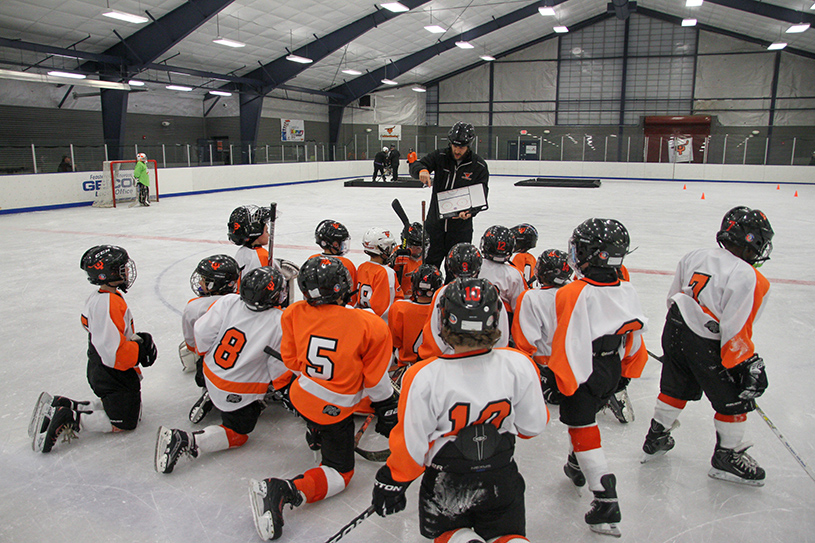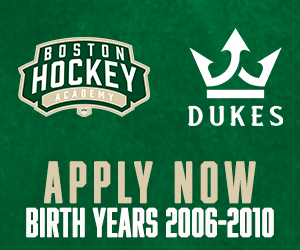by Jashvina Shah
When he graduated from high school in 2015, Diquan Jackson wanted to attend West Chester. But his grades weren’t good enough, so he enrolled in the Community College of Philadelphia and became a part-time coach at Snider Hockey.
Jackson joined Snider Hockey in 2008 as a player and started skating at Scanlon Ice Rink, two blocks away from his home. He played on some of the organization’s first ravel teams and submitted his GPA every month.
“I truly enjoy just being at the rink,” Jackson said. “I love putting smiles on people’s faces. I love just making people have better days.”
He’s been coaching for three years and currently serves as a coach on Snider Hockey’s 18U in-house team, which just won the Snider Hockey League championship. The level three USA hockey certified coach does more than just teach hockey, though. He also mentors his players.
“The players are comfortable with asking me questions and I answer them truthfully and I give them advice,” Jackson said. “They know of the place that I come from. It’s very similar to theirs and they feel like I can connect with them and I can relate to them. So when it comes to mentoring life lessons, that’s what I mainly talk to them about. I’m like a life skills type of a coach.”
In one instance, an 18U player asked Jackson why everyone stressed education and post-high school opportunities so much.
“What I told him is that the place that you live, you’re not really expected as much when it comes to education, and you’re probably not really expected to even pursue education,” Jackson said. “It comes down to you bettering yourself and wanting to do better for yourself.”
That player will be enrolling in the Community College of Philadelphia for next fall. But Jackson won’t be there anymore, as Jackson will be transferring to West Chester and will graduate debt free thanks to Snider Hockey’s Goals and Assists scholarships.
“I wouldn’t have ever even done this if they wouldn’t have helped me and motivated me to pursue my education to go to the Community College of Philadelphia,” Jackson said.
“Snider hockey is a great program. It’s one of those programs that you never really want to get away from because it doesn’t feel like a job. It feels like somewhere you want to be.”
***
Ed Snider founded Snider Hockey in 2005 with one purpose: To use hockey to build better lives for youth. It combines hockey, academic guidance and mentorship to help underprivileged children in Philadelphia.
“The whole model is this idea of getting a kid involved at an early age and helping him or her fall in love with the sport and then using that as the hook to support their academic and character growth,” Executive vice president Jan Koziara said.
Snider Hockey has 33 in-house teams that play in the Snider Hockey League and 17 travel teams that player Tier II hockey in the Delaware Valley Hockey League. There are also girls-specific teams and practices, which make up for 15 percent of registered girls in USA Hockey’s Atlantic District, the most from any program. Snider Hockey also has partnerships with a couple of junior teams in Team Virtua and the Junior Flyers.
Off-ice Snider Hockey focuses on academics and teaches players life skills and nutrition. They partner with 339 public, parochial and charter schools, and the only requirement to play is having a C grade or higher. Players who fall below that or struggle with behavior and attendance in school receive limited ice time and are required to attend tutoring sessions.
“When we started, Snider hockey was primarily a school day program so kids were coming to the rink as part of their physical education requirement during the school day. They play hockey six sessions over three to six weeks and then they go on their way,” Koziara said. “Ed Snider said that’s not what I want this to be. I want this to be about making sure that kids have every opportunity to succeed and we want to be there with them every step of the way. So we transformed into an after-school program and that’s really where this thing took off.”
In 2016-17 there were 4,000 report cards collected. Of that, 70 percent had A’s or B’s and just 666 mandatory tutoring sessions. Of all the students, 67 percent read at or above grade level.
Snider Hockey stresses post-secondary education once students are in middle school and helps with the college application process through informational sessions, tours, potential career interests and financial aid. Snider Hockey recently introduced the Goals and Assists scholarship, which allows members to graduate from a four-year college debt free. Players who graduate from Snider also receive stipends for every semester they check in. There is also the Breakaway program, which offers scholarships for high-performing students to attend private schools.
The program is located in seven rinks throughout Philadelphia thanks to a partnership with Philadelphia Parks and Recreation. Snider Hockey provides everything for its players from tutors to equipment, which is mostly purchased by the organization. While there are volunteers who work with Snider Hockey, there are also paid coaching positions.
“We do have volunteers engaged but we also have employees to make sure they have stability because without those role models, those consistent, positive role models, you don’t develop the relationships that can help kids see a positive change,” Koziara said.
***
Rosita Castro and her three brothers were always being enrolled in different sports as kids. One day their parents discovered Snider Hockey and Castro was hooked. In 2008, she began playing for Snider Hockey.
She loved hockey, but not academics. So when she first joined Snider Hockey, Castro required mandatory tutoring sessions. She wasn’t even sure she wanted to go to college, but she improved her grades and became an Academic All-Star and a straight-A student.
“[My coaches] were just pushing me to stay in school, pushing me to do all my work,” Castro said. “Every time I get a report card I’ll show them and then they would know what classes I’m struggling in and what classes I’m good in. It doesn’t matter what it is. It could be art, it could be whatever. They will help me and make sure that I have very good grades.”
Despite her initial hesitance to go to college, Castro went to her coach, Casey Kilduff, for guidance. Kilduff helped Castro find colleges along with information needed to apply. Castro just finished her last year of U19 girls hockey and will attend West Chester in the fall for free thanks to the Goals and Assists scholarship.
“Snider just set me straight,” Castro said. “Everything. I love it all. Even though it’s hard sometimes, but they set me straight. I wouldn’t be here without them.”
***
Of Snider Hockey’s 3,000-plus members, 80 percent hail from low-income neighborhoods while 70 percent are minorities. With over 2,100 members who are minorities, there have been instances where players have been called racial and gendered slurs during competition.
“Unfortunately some of the stuff we see is really ugly, and that’s a reflection of our society. But everybody here does their best to again draw those conversations out and explore them and try to help everybody involved learn from them,” Koziara said.
While Jackson didn’t encounter racist slurs while playing, he has noticed that race sometimes acts as a barrier to entry for players of color in hockey.
“When I first started, it wasn’t really accepted for someone as my race to be playing hockey,” Jackson said. “So I feel like that could be a barrier for other kids.”
Conversations about slurs — what they are and why they’re inappropriate — begin when players are young. Players are instructed to report incidences to their coaches and to take the “high road,” modeling behavior off role models Wayne Simmonds and Willie O’Ree, who are on Snider Hockey’s Board of Directors.
“Don’t let that distract you from being the best hockey player that you can be, because ultimately that may be why your opponent is resorting to that tactic,” Koziara said. “And that sounds really easy, and it’s not. It’s not easy for, I’m sure its’ not easy for the players involved and their families.”
Coaches are instructed to report incidences to officials and to USA Hockey. Koziara said, in his experience, USA hockey has investigated each reported incidence.
“I think that we’ve seen a change,” Koziara said. “I’m not saying that it’s gone away, but I think that there’s been more awareness and I think less of those kinds of issues, whether that’s a coincidence or whether that has something to do with us discussing it, I don’t know, but I’m hopeful that things are improving.”
***
Josh Stephenson loved hockey growing up. His dad was always watching Flyers games, which soon branched out to college and international hockey. But there were no programs in his area, so Stephenson never played. Until in 2012, when he found Snider Hockey.
Each year Stephenson attends more than 100 practices and games. This past season he played for the 18U team that went to nationals.
“Everyone on the team was dialed in, they knew what they wanted,” Stephenson said. “We wanted to make it to the playoffs and we did. Unfortunately, we lost in the first round of the playoffs but it was a great season with the team. We’ve grown as friends and some of my teammates are also going to go to West Chester as well, so kind of becoming more like brothers I would say.”
Snider Hockey provided more than just a chance to play the sport he loves, but also an environment that helped him deal with life challenges, including losing his grandfather.
“It kind of felt like a second home and every time I’ve been a part of Snider or participated with Snider, it takes my mind off problems that I’m facing at home,” Stephenson said. “It was hard losing my grandfather, but just playing hockey it really helped get my mind off it.”
Over the past six years, Stephenson has relied on his coaches for hockey knowledge, and they’ve always been available to help him with any questions. While Stephenson wishes he’d taken more advantage of Snider Hockey’s tutoring, he used the organization to help him decide between college and juniors, go on tours and learn about different academic programs. Stephenson will attend West Chester through a Goals and Assists scholarship, where he plans on studying engineering or potentially business.
“I joined only thinking that I would learn the skills of ice hockey,” Stephenson said. “They are more than ice hockey. They do tutoring, they do counseling, they do a lot of things. … It was very beneficial to me. …. It’s more than just ice hockey programs. I don’t even know how to describe it. It’s really amazing, honestly.’
***
In 2016-17, eight players were part of the Goals and Assists program and 15 were part of the Breakaway program. Last season Snider Hockey sent two players to the Quebec Pee-Wee Hockey Tournament. Next year they will have 10 players in Tier I junior hockey and will field three teams in the Mid Atlantic Women’s Hockey Association.
They also had two members intern at Comcast and raised 1.2 million dollars through a Flyers celebrity golf invitational. Some players met Hockey Hall Of Famer Willie O’Ree while others were surprised by the women’s national team.
“We are always working to get better and to do more for kids and we’re nowhere near done. That’s the culture here,” Koziara said. “There’s a culture of excellence and a continuous search for excellence, a continuous pursuit of excellence, and it’s been a challenging journey but a fun journey because we have great people that work here and some amazing people that support us.”
The next step in growth resides in improving academic and hockey pathways, which starts with improving both scholarship programs and creating more routes to junior and college hockey.
“On the hockey side, we would love to have someone playing for the Flyers one day and ideally after getting a 4.0 at a great college and playing hockey there,” Koziara said.
While there are many possibilities for both academic and hockey expansion, there’s no question Snider Hockey has already helped many, as Jackson noted one day during the program’s summer camp.
“I was really just sitting down thinking about everything and it’s crazy how there’s a bus that’s just literally just scooping kids out of these neighborhoods and bringing them to something better,” Jackson said.
“It was just crazy because like these kids would never have had the opportunity if it wasn’t for Snider and I just think it’s a really great program and a real eye-opener for kids that never really had the opportunity or the chance or probably wouldn’t have the chance to experience the thing they’re experiencing.”





